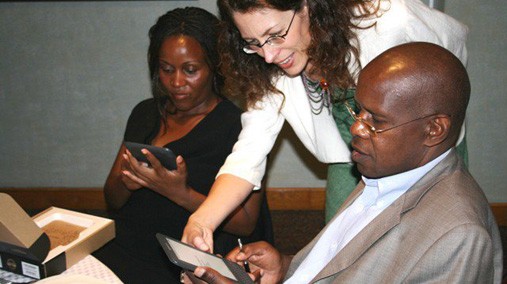Art can be an effective and valuable medium in the facilitation of cultural diplomacy. It transcends human barriers such as language and generates empathy. On an international level it can be an effective tool in the...
KEEP READINGThe CPD Blog is intended to stimulate dialog among scholars and practitioners from around the world in the public diplomacy sphere. The opinions represented here are the authors' own and do not necessarily reflect CPD's views. For blogger guidelines, click here.
The ‘Smart Power’ of Books in Building Bilateral Relations
On August 10, 1878, along the shore of a hazy blue lake in southwestern New York state, a Methodist Bishop and his flock of summer retreat parishioners kicked off a book club with big ambitions. Their four year course of independent reading aimed to raise education levels all across small town and rural America. More than 8,400 people enrolled that first year, returning to their homes to start over 10,000 local “circles” by 1900. This 19th century “literary circle” is now the oldest continuous book club in America – the Chautauqua Literary and Scientific Circle.
CLSC founder Bishop John Heyl Vincent based the book club concept on his belief that "education, once the peculiar privilege of the few, must in our best earthly estate become the valued possession of the many." His concept helped spur the popularity of public libraries, adult continuing education, and neighborhood book clubs. Still going today, 115 people graduated on August 8, 2012 as the 130th CLSC class, including – for the first time – twelve members of the nascent CLSC-Zimbabwe reading circle.
In March 2011, my embassy in Harare, Zimbabwe, started two CLSC groups using Kindle e-readers loaded with twelve CLSC books. With seed money from the State Department’s Public Diplomacy Innovation Fund, we invited opinion leaders from various spheres of life – politics, media, religion, academia and civil society -- to meet every two months over a meal at the Ambassador’s residence or another diplomat’s house to discuss the books. Given the tense relations between the U.S. and Zimbabwe over the last decade, these knowledge-focused, apolitical meetings were a forum for creating person-to-person relations to improve and advance bilateral relations.

Sharon Hudson-Dean with members of CLSC Zimbabwe, photo from blogs.state.gov
Book clubs are rare in Zimbabwe as books are an expensive luxury that few people are able to prioritize in their carefully calculated monthly budgets. Zimbabwe’s per capita GDP in 2011 was $500 compared to $49,000 in the United States and $11,100 in neighboring South Africa. Despite this and a paucity of information sources, including the dominant, partisan state media, Zimbabwe still has a 90% literacy rate – one of the highest in Africa. Zimbabweans highly value education and will save meticulously to send their children to good schools or abroad to university if at all possible.
The book clubs struck a chord with our Zimbabwean counterparts. We invited moderates from across the political spectrum and received numerous phone calls from others who “saw my colleague in Parliament with a Kindle” and wanted to join. The gatherings have had many positive spin-off results, but the main achievement of these intellectual, meaningful discussions was building a platform on which we can seriously talk – face to face -- about the larger ideals of human rights, democracy, and economic empowerment. Our carefully selected reading list (drawn from the historical list that dates back to the first CLSC) includes Justice: What’s the Right Thing To Do? by Harvard’s world famous political philosophy professor, Michael Sandel, Stephen Schlesinger’s detailed Act of Creation: The Founding of the United Nations, and Say You’re One of Them, short stories about children and their various harsh realities in several African countries by Uwem Akpan.
At times in the recent past, U.S. and Zimbabwean leaders have spoken to the world at large but not to each other. Strong statements have been released by Washington, while the ZANU-PF government has used its daily bully pulpit to condemn us, accusing “the West” of neo-colonial conspiracies. At the worst of times, no direct contact was made and the rhetoric was inflamed. But things have improved in the last four years. The election crisis and violence of 2008 led to the creation of a “unity” government made up of ZANU-PF and its rivals, MDC-T and MDC-N. The economy has stabilized and cases of political violence diminished. All of these factors provided an opening for rebuilding relationships and promoting an important dialogue on issues that matter.
It is critical that when diplomatic doors like these open in any country, platforms are created to take advantage of them. The CLSC-Zimbabwe book clubs have started a dialogue that strengthens our foreign policy and gives us a non-confrontational venue for tackling various topics. In her confirmation testimony of January 2009, Secretary Clinton laid out the State Department’s mandate clearly: “The best way to advance America's interests in reducing global threats and seizing global opportunities is to design and implement global solutions. ...We must use what has been called ‘smart power,’ the full range of tools at our disposal -- diplomatic, economic, military, political, legal and cultural -- picking the right tool or combination of tools for each situation. With smart power, diplomacy will be the vanguard of our foreign policy." By reading and discussing great books, we’re all getting smarter and pushing the bilateral relationship to get a better grade too.
Visit CPD's Online Library
Explore CPD's vast online database featuring the latest books, articles, speeches and information on international organizations dedicated to public diplomacy.
POPULAR ARTICLES
-
January 29
-
January 20
-
January 28
-
January 2
-
January 8
Join the Conversation
Interested in contributing to the CPD Blog? We welcome your posts. Read our guidelines and find out how you can submit blogs and photo essays >.













